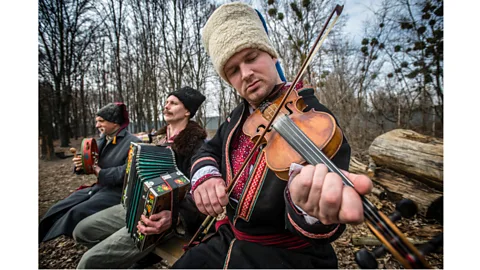Though Heil mostly just samples and sings traditional harmonies, it is not unusual for pop musicians in Ukraine to double as ethnomusicologists, visiting remote regions to record traditional folk music to blend with modern songs, as Ruslana did for Wild Dances. This ethnomusicology was banned under the Soviet Union, which wanted to suppress Ukrainian folk culture, even going as far as persecuting and killing folk musicians. Ethnomusicologist Maria Sonevytsky told the New York Times that, by the 1930s, the Stalinist regime had carried out mass executions of bandura [a Ukrainian folk instrument] players throughout the country.
Since the Soviet Union collapsed, this fusion of traditional and modern music in Ukraine has boomed, pioneered in particular by DakhaBrakham, Ukraine's equivalent of German band Rammstein, according to Christian Diemer, a musicologist who researches folk music and Ukrainian national identity. He sees this proud blend of folk history and modern cosmopolitan music as one of the main cultural elements that differentiates it from Russia.
"These bands, they go to great lengths in finding this traditional cultural heritage. They are active as researchers and go to the villages, record the authentic songs by old people as they're being sung in those regions," Diemer tells BBC Culture. "They'll go back and blend that with more popular and globalised styles. They use styles like rap or rock but the outcome is pretty innovative and pretty advanced. It goes beyond just sampling. They innovate something that is new and still genuinely authentic."
"It's urban hipsters versus villagers. They wouldn't normally meet, but they do through music. This globalised, trans-cultural crossover music is unique, has emerged in the last 10-15 years, and has made Ukrainian cultural life so interesting and innovative. Dealing with tradition and identity – it's progressive, contemporary, avant-garde."
 Getty Images
Getty ImagesThough in the past, Russian-language music dominated, and pop musicians were urged to sing in Russian to reach a wider audience, in 2019 a law making Ukrainian the sole official language was ed which included quotas of Ukrainian music on the radio. Analysis has shown that the proportion of music in Ukrainian on the radio has increased significantly since 2016, reaching up to 65% in the Western region of Lviv in the Ukrainian language in 2020.
According to Diemer, this cultural preservation is a key method of resisting Russian imperialism. "The goal of the war is to destroy all of this. Russia wants to annihilate any notion of Ukrainian cultural identity, and national identity too. Culture plays an important role – the Russian leadership are saying this quite explicitly. They are using culture as a tool to achieve that end – by destroying museums, ethnographic collections, and by killing the carriers of culture and 'Russifying' the people under occupation. It's at the core of the Russian agenda."
The Ukrainian response makes sense. Whether it's expressed in folk music, historic buildings, theatre, or anything else, Ukrainian culture shows the country's distinctiveness from Russia. Jerry Heil agrees, and sees it as her mission to spread Ukrainian culture beyond the country's borders. "We have been struggling for our culture for a long time, and it's a miracle that this culture survived. If it's that strong, then we have to show it to the world."
If you would like to comment on this story or anything else you have seen on BBC Culture, head over to our Facebook page or message us on Twitter.
And if you liked this story, sign up for the weekly bbc.com features newsletter, called The Essential List. A handpicked selection of stories from BBC Future, Culture, Worklife and Travel, delivered to your inbox every Friday
